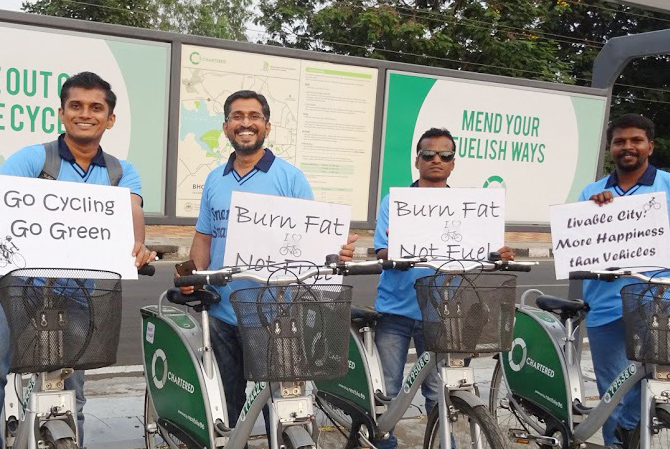
|

|
The best way to find yourself is to lose yourself
in the service of others.
- mahatma gandhi
|

|


|
The best way to find yourself is to lose yourself
in the service of others.
- mahatma gandhi
|


The Livable Cities project is supported by Health Bridge Canada, an organization works with partners world-wide to improve health and health equity through research, policy and action.
“Livable Citiesâ€, literally, refers to cities that have
favorable living conditions. In fact, “livability†is quite a broad term that
has no single definition. CFI’s Livable Cities Project is currently focusing on
improving the conversation around urban planning and its relationship with the
Non Communicable Diseases that has reached epidemic proportions.
A recent study
titled India: Health of the Nation’s States conducted by the Indian
Council for Medical Research (ICMR), and the Public Health Foundation of India
(PHFI) revealed that in India, from 1990 to 2016, non-communicable diseases
(NCD) — heart disease, cardiovascular diseases, diabetes and chronic
respiratory diseases — have caused more deaths in an year than the
traditionally feared communicable diseases. The study also highlights that
malnutrition continue to be India’s biggest health hazard.
CFI’s Project has
identified two broader areas to begin its interventions namely the importance
of Open spaces and Access to healthy foods in Bhopal city. Specifically the
project has started looking into understanding and addressing issues
surrounding Public Parks and Vegetable markets.
Intervention in Parks
The project has undertaken a brief assessment (Park Audit)
of 31 Parks in Bhopal City, which looked into the park infrastructure,
equipment available, parking area, safety and protection measures, greenery and
the maintenance.
The project has identified five public parks for focused
intervention, four managed by Bhopal Municipal Corporation and one managed by
Bharat Heavy Electricals Limited. The project envisages from these parks to
derive examples for policy discussion around the concept of inclusive parks,
park governance, emphasizing safety and protection and increasing park usage by
the people living in the margins.
During the park audit, focus group discussions held with the
community representatives residing in the vicinity of parks have revealed the
following issues that require community lead actions.
The project is reaching out to communities to explore their
concerns and to make them aware of the importance of public spaces at the wake
of menacing epidemic of Non-Communicable Diseases. The project is gearing up to
understand the policy environment regarding parks and engaging relevant
stakeholders for policy dialogues.
Intervention in Vegetable Markets
People living in the cities will experience obstacles to
access healthy food, unique to their environment. Some of the challenges are
confronted not only by low-income families, but by people of all income levels
wishing to purchase more local foods and to add fresh food to their diet.
Unlike the full service grocery stores in the west, Indian cities including
Bhopal traditionally are catered by weekly and daily open-air markets. These
markets are primary source of accessing raw food material for the majority till
today. However shrinking space of open markets across the city has become a
major cause of concern.
The livable cities project is currently collecting and
collating information and findings from research studies available to develop
advocacy asks and frame an advocacy strategy to protect and promote the
open-air markets in the city.
From the preliminary interactions, some of the major issues
the project identified to explore further are (1) Defunct societies that were
responsible for market management and welfare (2) Illegal Encroachment of
market land (3) Poor infrastructure with unhygienic environment (4) Improper
waste disposal and management (5) Lack of a common platform for vendors’
associations and lack of awareness about their right and entitlements.
The project also has begun a mapping of open-air markets
functioning in the city and a situation analysis to enable adequate
representation of issues at relevant platforms.